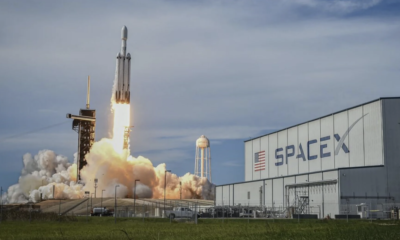Technology
South Korea to deploy new-age technology to track COVID-19 infections
Despite privacy concerns, South Korea is set to deploy a pilot project to track people with COVID-19 infections through artificial intelligence, facial recognition, and CCTV cameras. This nationally funded project will become operational in January in Bucheon.
Officials told Reuters that the system uses AI algorithms and facial recognition technology to analyze footage collected by more than 10,820 CCTV cameras and track an infected person’s movements, anyone they had close contact with, and whether they were wearing a mask.
Through this system, the South Korean government is looking at reducing the strain on overworked tracing teams in Bucheon with a population of more than 800,000 people, and help use the teams more efficiently and accurately. The system is also designed to overcome the fact that tracing teams have to rely heavily on the testimony of COVID-19 patients, who aren’t always honest about their activities and whereabouts.
It can simultaneously track up to ten people in five to ten minutes, cutting the time spent on manual work that takes around half an hour to one hour to trace one person. The official said the pilot project calls for a team of about 10 staff at one public health centre to use the AI-powered recognition system.
Jang Deog-cheon, Bucheon mayor, believed that such a system would make tracing faster. “It sometimes takes hours to analyze a single CCTV footage. Using visual recognition technology will enable that analysis in an instant,” he tweeted.
With the advent of the COVID pandemic, governments across the world have turned to new technologies and expanded their legal powers to stem the spread of the virus. According to a report by the Columbia Law School in New York, the governments of China, Russia, India, Poland and Japan as well as various states in the US have rolled out or trialed with facial recognition systems to track COVID-19 patients.
Some South Korean lawmakers have expressed concerns that the government will retain and harness such data far beyond the needs of the pandemic. Park Dae-chul, a lawmaker from People Power Party, said the government’s plan to become Big Brother on the pretext of COVID is a neo-totalitarian idea. “It is absolutely wrong to monitor and control the public via CCTV using taxpayers’ money and without the consent from the public.”
Also Read: The Great Resignation 2021: All You Need to Know
However, a Bucheon official said there are no privacy concerns because the system places a mosaic over the faces of anyone who is not a subject. “There is no privacy issue here as the system traces the confirmed patient based on the infectious Disease Control and Prevention Act. Contact tracers stick to that rule so there is no risk of data spill or invasion of privacy.”








































Pingback: A new variant doesn’t mean that things will be worse.